
by Ria Olivier | Jun 19, 2025 | Antarctica, Environment, Gough Island, International Days, Marion Island, Mice Eradication, Ornithology
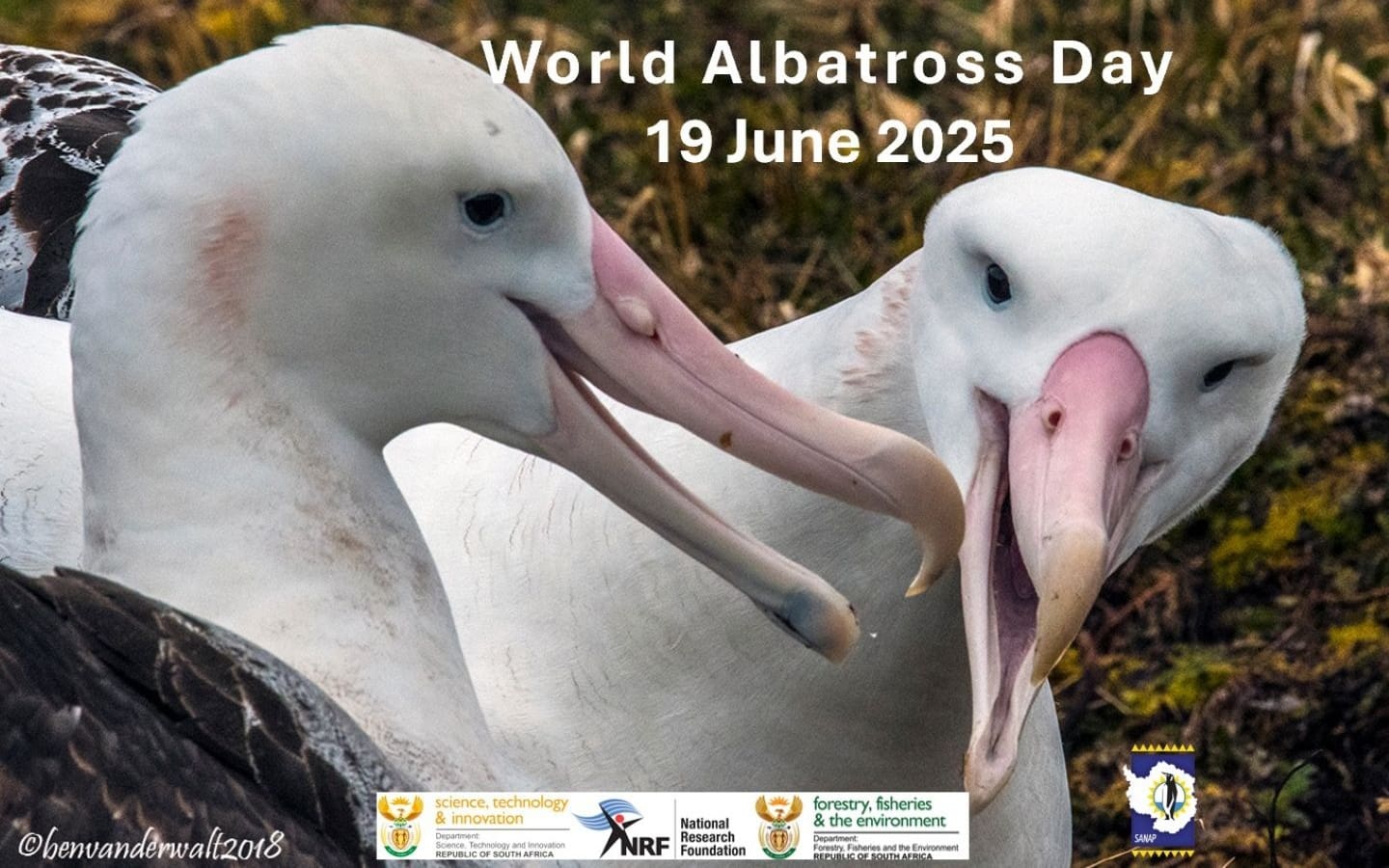 19 June 2025 marks World Albatross Day, a global celebration of these magnificent seabirds whose wide wingspans and far-ranging flight paths have long captured the imagination of sailors, scientists, and nature lovers alike. For South Africa, and particularly for the South African National Antarctic Programme (SANAP), this day highlights not only the beauty and ecological importance of albatrosses—but also the urgent need to protect them.
19 June 2025 marks World Albatross Day, a global celebration of these magnificent seabirds whose wide wingspans and far-ranging flight paths have long captured the imagination of sailors, scientists, and nature lovers alike. For South Africa, and particularly for the South African National Antarctic Programme (SANAP), this day highlights not only the beauty and ecological importance of albatrosses—but also the urgent need to protect them.
At the heart of SANAP’s commitment to seabird conservation is ongoing research and monitoring on Marion Island, one of the two Prince Edward Islands in the Southern Ocean. Marion Island is home to several albatross species, including the iconic Wandering Albatross, known for having the largest wingspan of any bird in the world. These seabirds are critical indicators of ocean health, and their survival is closely linked to the stability of sub-Antarctic ecosystems.
 SANAP scientists have been conducting long-term ecological studies on albatross population trends, breeding behaviour, and foraging ecology, using tracking devices and direct observation to better understand how climate change, ocean dynamics, and human activities are impacting these vulnerable birds.
SANAP scientists have been conducting long-term ecological studies on albatross population trends, breeding behaviour, and foraging ecology, using tracking devices and direct observation to better understand how climate change, ocean dynamics, and human activities are impacting these vulnerable birds.
 A major step in protecting Marion Island’s seabirds is the Mouse-Free Marion Project—a large-scale conservation effort aimed at eradicating invasive house mice that prey on albatross chicks and other native birds. These mice, unintentionally introduced by humans, have developed aggressive predatory behaviours that threaten the survival of not only the Wandering Albatross but also Grey-headed, Sooty, and Light-mantled Albatrosses, as well as burrowing petrels and other island species. The Mouse-Free Marion project represents one of the most important island restoration initiatives globally, and a critical investment in the long-term survival of South Africa’s seabird populations. Success will mean a safer future for generations of albatrosses nesting on this remote and windswept island.
A major step in protecting Marion Island’s seabirds is the Mouse-Free Marion Project—a large-scale conservation effort aimed at eradicating invasive house mice that prey on albatross chicks and other native birds. These mice, unintentionally introduced by humans, have developed aggressive predatory behaviours that threaten the survival of not only the Wandering Albatross but also Grey-headed, Sooty, and Light-mantled Albatrosses, as well as burrowing petrels and other island species. The Mouse-Free Marion project represents one of the most important island restoration initiatives globally, and a critical investment in the long-term survival of South Africa’s seabird populations. Success will mean a safer future for generations of albatrosses nesting on this remote and windswept island.
This World Albatross Day, we celebrate the tireless work of scientists, conservationists, and partners who are helping to give these majestic ocean wanderers a fighting chance. Let’s continue to raise awareness and support efforts to keep the skies above the Southern Ocean filled with soaring wings.

by Ria Olivier | Jun 8, 2025 | International Days, Oceanography, Uncategorised
One Ocean, One Climate, One Future – Together
 On 8 June 2025, the SANAP community celebrates World Oceans Day under the powerful theme: One Ocean, One Climate, One Future – Together. At the heart of this theme lies a call to protect our blue planet through collective research, and deepened understanding of the critical role our oceans play in shaping the Earth’s climate and supporting life.
On 8 June 2025, the SANAP community celebrates World Oceans Day under the powerful theme: One Ocean, One Climate, One Future – Together. At the heart of this theme lies a call to protect our blue planet through collective research, and deepened understanding of the critical role our oceans play in shaping the Earth’s climate and supporting life.
 For the South African National Antarctic Programme (SANAP), this is more than a celebration—it’s a reaffirmation of our mission – Understand, Develop and Conserve. Our Southern Ocean research efforts are driven by the urgent need to understand the links between ocean health, climate change, and the wellbeing of future generations. South Africa, as a gateway to Antarctica and the Southern Ocean, plays a key scientific and logistical role in advancing global knowledge of polar and marine systems.
For the South African National Antarctic Programme (SANAP), this is more than a celebration—it’s a reaffirmation of our mission – Understand, Develop and Conserve. Our Southern Ocean research efforts are driven by the urgent need to understand the links between ocean health, climate change, and the wellbeing of future generations. South Africa, as a gateway to Antarctica and the Southern Ocean, plays a key scientific and logistical role in advancing global knowledge of polar and marine systems.
 Sometimes called the lungs of the planet, the Southern Ocean absorbs vast amounts of carbon dioxide and heat, making it one of the most crucial regulators of Earth’s climate. It drives ocean circulation, supports unique ecosystems, and connects all major ocean basins. However, it is also one of the fastest-changing regions due to climate change—warming waters, shifting ice dynamics, and altered ecosystems pose challenges that demand urgent scientific attention.
Sometimes called the lungs of the planet, the Southern Ocean absorbs vast amounts of carbon dioxide and heat, making it one of the most crucial regulators of Earth’s climate. It drives ocean circulation, supports unique ecosystems, and connects all major ocean basins. However, it is also one of the fastest-changing regions due to climate change—warming waters, shifting ice dynamics, and altered ecosystems pose challenges that demand urgent scientific attention.
 SANAP’s Research Footprint
SANAP’s Research Footprint
 Through SANAP, South African researchers from various institutions are contributing world-class science to understand and protect the Southern Ocean:
Through SANAP, South African researchers from various institutions are contributing world-class science to understand and protect the Southern Ocean:
- The University of Cape Town (UCT) leads long-term monitoring programs on carbon fluxes, ocean-atmosphere interactions, and ecosystem responses to warming. MARiS includes the Antarctic MIZ Observations: Interdisciplinary approaches to resolve seasonal sea-ice variability. The SEAmester floating classroom initiative also trains young scientists at sea, combining education with real-time research.
- Stellenbosch University contributes cutting-edge work in marine microbiology and ocean biogeochemistry, studying the role of microscopic life in global carbon cycling and nutrient dynamics.
- Nelson Mandela University focuses on marine top predators, such as seals and penguins, to track ecosystem health and food web shifts in response to
- South African Weather Service project includes the decoding the mercury cycle in the Southern Ocean: in situ observations and advanced modelling
- CSIR – Smart Places – SOCCO has two projects focusing on the Southern Ocean Carbon-Heat Nexus: mixed-layer processes & feedback for improved climate projections and emergent constraints on Southern Ocean phytoplankton physiology (ECOSOPHY)

by Ria Olivier | Jun 5, 2025 | Antarctica, Environment, Gough Island, International Days, Marion Island, SANAP
Today, on World Environment Day, SANAP join the global community in recognizing the vital importance of our planet’s ecosystems — and reaffirm its commitment to understanding and protecting one of the most extreme, yet crucial, environments on Earth: The Southern Ocean and Antarctic regions. SANAP leads scientific research and environmental stewardship across Marion Island, Gough Island, and Antarctica. These frontiers may seem remote, but they play a critical role in regulating Earth’s climate, supporting unique biodiversity, and offering invaluable insight into global environmental change.
 The Southern Ocean: A Climate Regulator: The Southern Ocean surrounding Antarctica is a house of climate regulation, absorbing vast amounts of atmospheric carbon and heat. SANAP researchers are actively researching ocean currents, sea ice dynamics, and carbon cycling to better understand how these processes are evolving in a warming world. (Photo credit: A Zietsman)
The Southern Ocean: A Climate Regulator: The Southern Ocean surrounding Antarctica is a house of climate regulation, absorbing vast amounts of atmospheric carbon and heat. SANAP researchers are actively researching ocean currents, sea ice dynamics, and carbon cycling to better understand how these processes are evolving in a warming world. (Photo credit: A Zietsman)
 Protecting Life on the Edge: From the wandering albatross on Marion Island to microscopic extremophiles in Antarctic soils, life persists against all odds in these regions. SANAP’s biodiversity monitoring projects are uncovering the intricate web of life that depends on these environments — and how threats such as invasive species, plastic pollution, and climate variability are impacting these ecosystems. (Photo Credit left: M Greve, middle & right: CJ Scheepers)
Protecting Life on the Edge: From the wandering albatross on Marion Island to microscopic extremophiles in Antarctic soils, life persists against all odds in these regions. SANAP’s biodiversity monitoring projects are uncovering the intricate web of life that depends on these environments — and how threats such as invasive species, plastic pollution, and climate variability are impacting these ecosystems. (Photo Credit left: M Greve, middle & right: CJ Scheepers)
 Long-Term Science, Global Impact: With decades of data collection and continuous human presence at SANAP’s research stations, SANAP long-term research projects offer insights into environmental change. Through collaborations with international partners, SANAP helps shape global understanding of polar processes and their far-reaching effects. This World Environment Day, SANAP celebrates the resilience of our southernmost ecosystems and the SANAP community is dedicated to its preservation. As stewards of the Antarctic and sub-Antarctic, SANAP remain committed to advancing knowledge, promoting conservation, and ensuring these unique environments endure for future generations. (Photo Credit: Greg Hofmeyr)
Long-Term Science, Global Impact: With decades of data collection and continuous human presence at SANAP’s research stations, SANAP long-term research projects offer insights into environmental change. Through collaborations with international partners, SANAP helps shape global understanding of polar processes and their far-reaching effects. This World Environment Day, SANAP celebrates the resilience of our southernmost ecosystems and the SANAP community is dedicated to its preservation. As stewards of the Antarctic and sub-Antarctic, SANAP remain committed to advancing knowledge, promoting conservation, and ensuring these unique environments endure for future generations. (Photo Credit: Greg Hofmeyr)
World Environment Day
World Environment Day is the biggest international day for the environment. Led by the United Nations Environment Programme (UNEP), and held annually since 1973, it has grown to be the largest global platform for environmental outreach. It is celebrated by millions of people across the world. The Republic of Korea will host World Environment Day 2025 with a focus on ending plastic pollution globally. Ridding the planet of plastic pollution is an important contribution to achieving the Sustainable Development Goals, including those on climate action, sustainable production and consumption, protection of seas and oceans and repairing ecosystems and retaining biodiversity. (Text: https://www.worldenvironmentday)

by Ria Olivier | May 22, 2025 | Antarctica, Biosecurity, Commemorative Days, Gough Island, International Days, Invasion Biology, Marion Island, Prince Edward Islands
 The United Nations has designated May 22 as the International Day for Biological Diversity (IDB), a day to reflect on the vital role biodiversity plays in sustaining life on Earth. The 2025 theme, “Harmony with Nature and Sustainable Development,” underscores the importance of conserving biodiversity to ensure a sustainable future for both people and the planet. It is a timely reminder that a thriving natural world is the foundation of human well-being and a cornerstone for achieving the Sustainable Development Goals.
The United Nations has designated May 22 as the International Day for Biological Diversity (IDB), a day to reflect on the vital role biodiversity plays in sustaining life on Earth. The 2025 theme, “Harmony with Nature and Sustainable Development,” underscores the importance of conserving biodiversity to ensure a sustainable future for both people and the planet. It is a timely reminder that a thriving natural world is the foundation of human well-being and a cornerstone for achieving the Sustainable Development Goals.
 In South Africa, this day holds special meaning for the South African National Antarctic Programme (SANAP). Operating across three key research stations — Antarctica, Marion Island (part of the Prince Edward Islands), and Gough Island — SANAP plays a crucial role in understanding and preserving the unique biodiversity of the sub-Antarctic and Antarctic regions. These remote and fragile ecosystems are home to countless species, many of which are found nowhere else on Earth.
In South Africa, this day holds special meaning for the South African National Antarctic Programme (SANAP). Operating across three key research stations — Antarctica, Marion Island (part of the Prince Edward Islands), and Gough Island — SANAP plays a crucial role in understanding and preserving the unique biodiversity of the sub-Antarctic and Antarctic regions. These remote and fragile ecosystems are home to countless species, many of which are found nowhere else on Earth.
 For decades, SANAP-supported scientists have been at the forefront of biodiversity research in these regions. Their work includes long-term monitoring of bird and marine mammal populations, studies on invasive species, climate change impacts, and ecosystem dynamics. Through rigorous field research and environmental stewardship, SANAP contributes to global knowledge and conservation efforts, ensuring these pristine environments continue to thrive for generations to come.
For decades, SANAP-supported scientists have been at the forefront of biodiversity research in these regions. Their work includes long-term monitoring of bird and marine mammal populations, studies on invasive species, climate change impacts, and ecosystem dynamics. Through rigorous field research and environmental stewardship, SANAP contributes to global knowledge and conservation efforts, ensuring these pristine environments continue to thrive for generations to come.
 On this International Day for Biological Diversity, SANAP reaffirms its commitment to protecting the biodiversity of the Southern Ocean and its islands — not only for their intrinsic value but also for the essential role they play in the global ecosystem.
On this International Day for Biological Diversity, SANAP reaffirms its commitment to protecting the biodiversity of the Southern Ocean and its islands — not only for their intrinsic value but also for the essential role they play in the global ecosystem.

by Ria Olivier | Apr 25, 2025 | Antarctica, Gough Island, International Days, Marine Protected Area, Marion Island, Mice Eradication, Ornithology, Research, SANAP
 Every year on April 25th, we celebrate International Penguin Day—a global reminder of the unique role penguins plays in our planet’s ecosystems. These birds are not just symbols of the icy South—they are indicators of ocean health and climate change. From the sub-Antarctic islands to the Antarctic continent itself, penguins serve as sentinels of the sea, helping scientists track environmental shifts that affect us all.
Every year on April 25th, we celebrate International Penguin Day—a global reminder of the unique role penguins plays in our planet’s ecosystems. These birds are not just symbols of the icy South—they are indicators of ocean health and climate change. From the sub-Antarctic islands to the Antarctic continent itself, penguins serve as sentinels of the sea, helping scientists track environmental shifts that affect us all.
 South Africa plays a vital role in this mission through its National Antarctic Programme (SANAP), which supports long-term ecological research at key sites such as Gough Island, Marion Island, and Antarctica. These research stations are crucial hubs for studying penguin populations like the Northern Rockhopper on Gough Island and the Macaroni penguins on Marion Island. Scientists monitor breeding patterns, foraging behaviour, and survival rates—data that provide early warnings about oceanic changes. In Antarctica, SANAP researchers study Adélie and Emperor penguins, whose survival is intimately tied to the health of sea ice and krill populations.
South Africa plays a vital role in this mission through its National Antarctic Programme (SANAP), which supports long-term ecological research at key sites such as Gough Island, Marion Island, and Antarctica. These research stations are crucial hubs for studying penguin populations like the Northern Rockhopper on Gough Island and the Macaroni penguins on Marion Island. Scientists monitor breeding patterns, foraging behaviour, and survival rates—data that provide early warnings about oceanic changes. In Antarctica, SANAP researchers study Adélie and Emperor penguins, whose survival is intimately tied to the health of sea ice and krill populations.
 By investing in these research efforts, South Africa not only contributes to global conservation science but also highlights the importance of protecting our shared polar heritage. This International Penguin Day let’s celebrate the science that keeps these beloved birds waddling into the future.
By investing in these research efforts, South Africa not only contributes to global conservation science but also highlights the importance of protecting our shared polar heritage. This International Penguin Day let’s celebrate the science that keeps these beloved birds waddling into the future.

by Ria Olivier | Apr 22, 2025 | International Days, Research, SANAP, Science
 On Earth Day 2025, we recognize the vital role of science in securing the future of our planet. South Africa’s commitment to environmental stewardship is powerfully reflected in its research presence at Antarctica, Marion Island, and Gough Island, under the South African National Antarctic Programme (SANAP). These remote, pristine locations serve as natural laboratories for understanding global climate systems, ocean circulation, and the health of marine ecosystems. From monitoring atmospheric carbon levels in Antarctica to studying biodiversity on Marion Island, South African researchers are gathering critical data that informs climate models, shapes conservation strategies, and guides global efforts to mitigate climate change.
On Earth Day 2025, we recognize the vital role of science in securing the future of our planet. South Africa’s commitment to environmental stewardship is powerfully reflected in its research presence at Antarctica, Marion Island, and Gough Island, under the South African National Antarctic Programme (SANAP). These remote, pristine locations serve as natural laboratories for understanding global climate systems, ocean circulation, and the health of marine ecosystems. From monitoring atmospheric carbon levels in Antarctica to studying biodiversity on Marion Island, South African researchers are gathering critical data that informs climate models, shapes conservation strategies, and guides global efforts to mitigate climate change.
 The work conducted through SANAP not only enhances our understanding of Earth’s most vulnerable environments but also strengthens global collaboration on environmental sustainability. Long-term monitoring of weather patterns, sea temperatures, and wildlife populations across these islands contributes directly to international climate assessments and helps predict future planetary changes. As we mark Earth Day, let us celebrate the dedication of researchers who brave the extremes to ensure a liveable Earth for generations to come. Their efforts remind us that the answers to many of our environmental challenges lie in the farthest corners of our world—and that the time to act on them is now.
The work conducted through SANAP not only enhances our understanding of Earth’s most vulnerable environments but also strengthens global collaboration on environmental sustainability. Long-term monitoring of weather patterns, sea temperatures, and wildlife populations across these islands contributes directly to international climate assessments and helps predict future planetary changes. As we mark Earth Day, let us celebrate the dedication of researchers who brave the extremes to ensure a liveable Earth for generations to come. Their efforts remind us that the answers to many of our environmental challenges lie in the farthest corners of our world—and that the time to act on them is now.
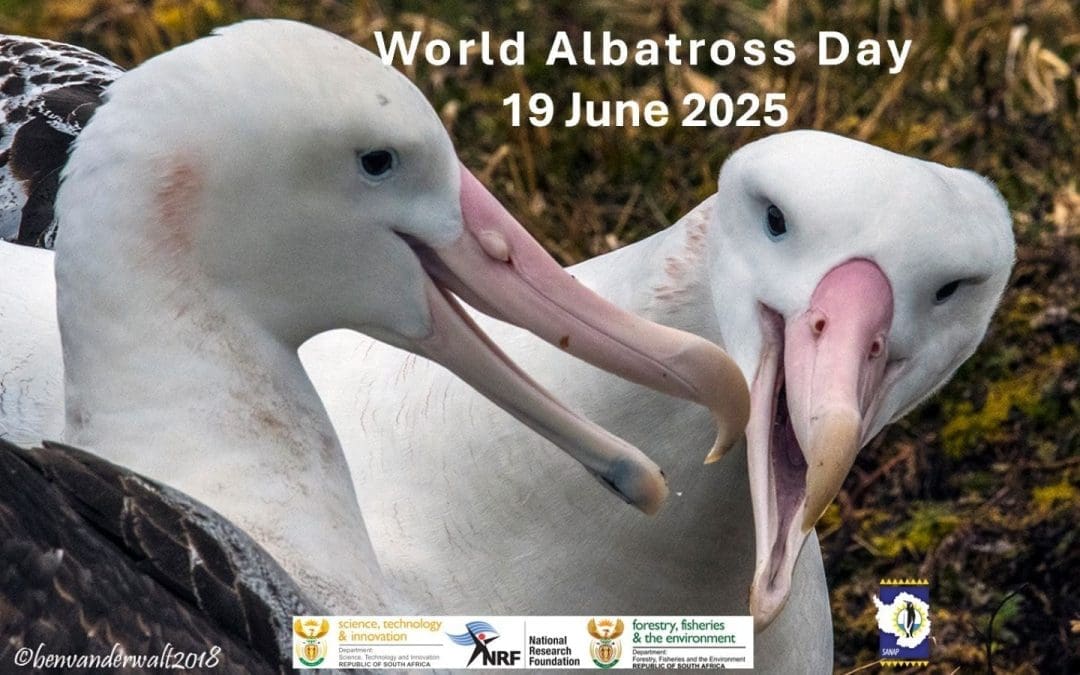
 19 June 2025 marks World Albatross Day, a global celebration of these magnificent seabirds whose wide wingspans and far-ranging flight paths have long captured the imagination of sailors, scientists, and nature lovers alike. For South Africa, and particularly for the South African National Antarctic Programme (SANAP), this day highlights not only the beauty and ecological importance of albatrosses—but also the urgent need to protect them.
19 June 2025 marks World Albatross Day, a global celebration of these magnificent seabirds whose wide wingspans and far-ranging flight paths have long captured the imagination of sailors, scientists, and nature lovers alike. For South Africa, and particularly for the South African National Antarctic Programme (SANAP), this day highlights not only the beauty and ecological importance of albatrosses—but also the urgent need to protect them. SANAP scientists have been conducting long-term ecological studies on albatross population trends, breeding behaviour, and foraging ecology, using tracking devices and direct observation to better understand how climate change, ocean dynamics, and human activities are impacting these vulnerable birds.
SANAP scientists have been conducting long-term ecological studies on albatross population trends, breeding behaviour, and foraging ecology, using tracking devices and direct observation to better understand how climate change, ocean dynamics, and human activities are impacting these vulnerable birds. A major step in protecting Marion Island’s seabirds is the Mouse-Free Marion Project—a large-scale conservation effort aimed at eradicating invasive house mice that prey on albatross chicks and other native birds. These mice, unintentionally introduced by humans, have developed aggressive predatory behaviours that threaten the survival of not only the Wandering Albatross but also Grey-headed, Sooty, and Light-mantled Albatrosses, as well as burrowing petrels and other island species. The Mouse-Free Marion project represents one of the most important island restoration initiatives globally, and a critical investment in the long-term survival of South Africa’s seabird populations. Success will mean a safer future for generations of albatrosses nesting on this remote and windswept island.
A major step in protecting Marion Island’s seabirds is the Mouse-Free Marion Project—a large-scale conservation effort aimed at eradicating invasive house mice that prey on albatross chicks and other native birds. These mice, unintentionally introduced by humans, have developed aggressive predatory behaviours that threaten the survival of not only the Wandering Albatross but also Grey-headed, Sooty, and Light-mantled Albatrosses, as well as burrowing petrels and other island species. The Mouse-Free Marion project represents one of the most important island restoration initiatives globally, and a critical investment in the long-term survival of South Africa’s seabird populations. Success will mean a safer future for generations of albatrosses nesting on this remote and windswept island.
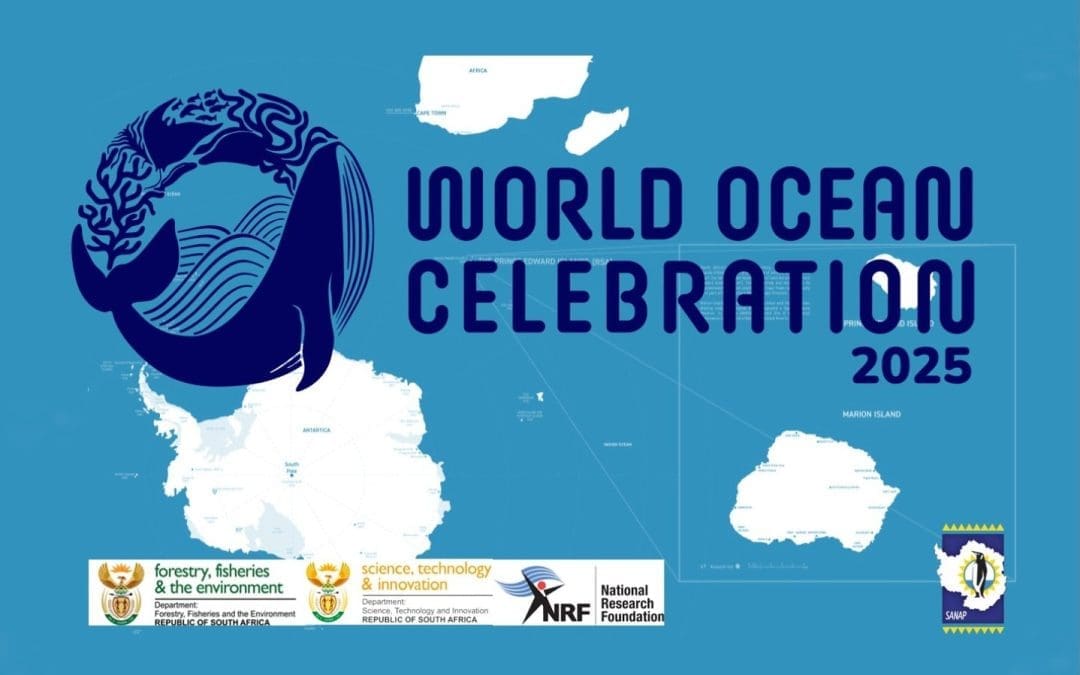
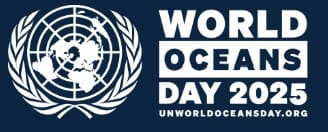 On 8 June 2025, the SANAP community celebrates World Oceans Day under the powerful theme: One Ocean, One Climate, One Future – Together. At the heart of this theme lies a call to protect our blue planet through collective research, and deepened understanding of the critical role our oceans play in shaping the Earth’s climate and supporting life.
On 8 June 2025, the SANAP community celebrates World Oceans Day under the powerful theme: One Ocean, One Climate, One Future – Together. At the heart of this theme lies a call to protect our blue planet through collective research, and deepened understanding of the critical role our oceans play in shaping the Earth’s climate and supporting life.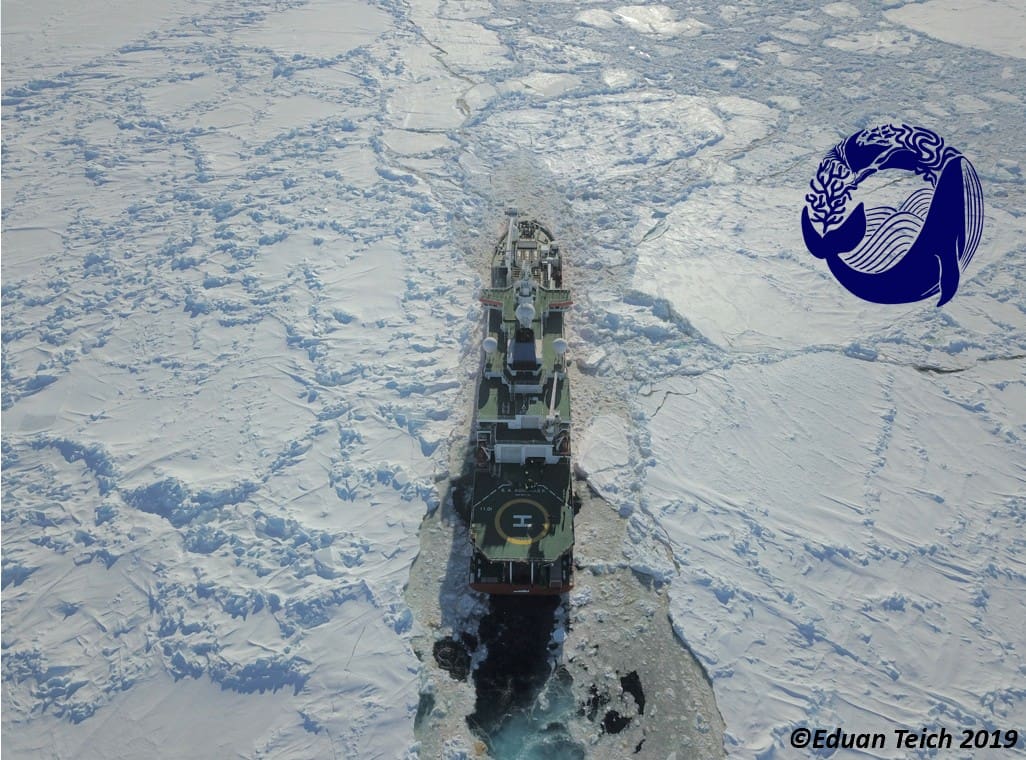 For the South African National Antarctic Programme (SANAP), this is more than a celebration—it’s a reaffirmation of our mission – Understand, Develop and Conserve. Our Southern Ocean research efforts are driven by the urgent need to understand the links between ocean health, climate change, and the wellbeing of future generations. South Africa, as a gateway to Antarctica and the Southern Ocean, plays a key scientific and logistical role in advancing global knowledge of polar and marine systems.
For the South African National Antarctic Programme (SANAP), this is more than a celebration—it’s a reaffirmation of our mission – Understand, Develop and Conserve. Our Southern Ocean research efforts are driven by the urgent need to understand the links between ocean health, climate change, and the wellbeing of future generations. South Africa, as a gateway to Antarctica and the Southern Ocean, plays a key scientific and logistical role in advancing global knowledge of polar and marine systems.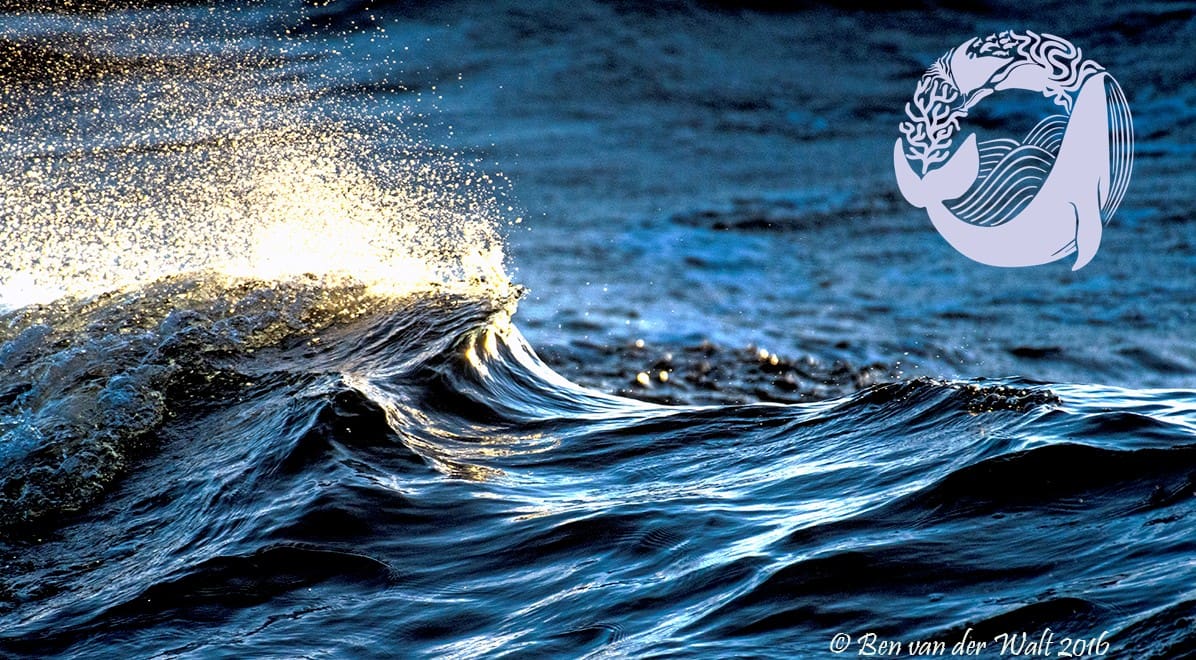 Sometimes called the lungs of the planet, the Southern Ocean absorbs vast amounts of carbon dioxide and heat, making it one of the most crucial regulators of Earth’s climate. It drives ocean circulation, supports unique ecosystems, and connects all major ocean basins. However, it is also one of the fastest-changing regions due to climate change—warming waters, shifting ice dynamics, and altered ecosystems pose challenges that demand urgent scientific attention.
Sometimes called the lungs of the planet, the Southern Ocean absorbs vast amounts of carbon dioxide and heat, making it one of the most crucial regulators of Earth’s climate. It drives ocean circulation, supports unique ecosystems, and connects all major ocean basins. However, it is also one of the fastest-changing regions due to climate change—warming waters, shifting ice dynamics, and altered ecosystems pose challenges that demand urgent scientific attention.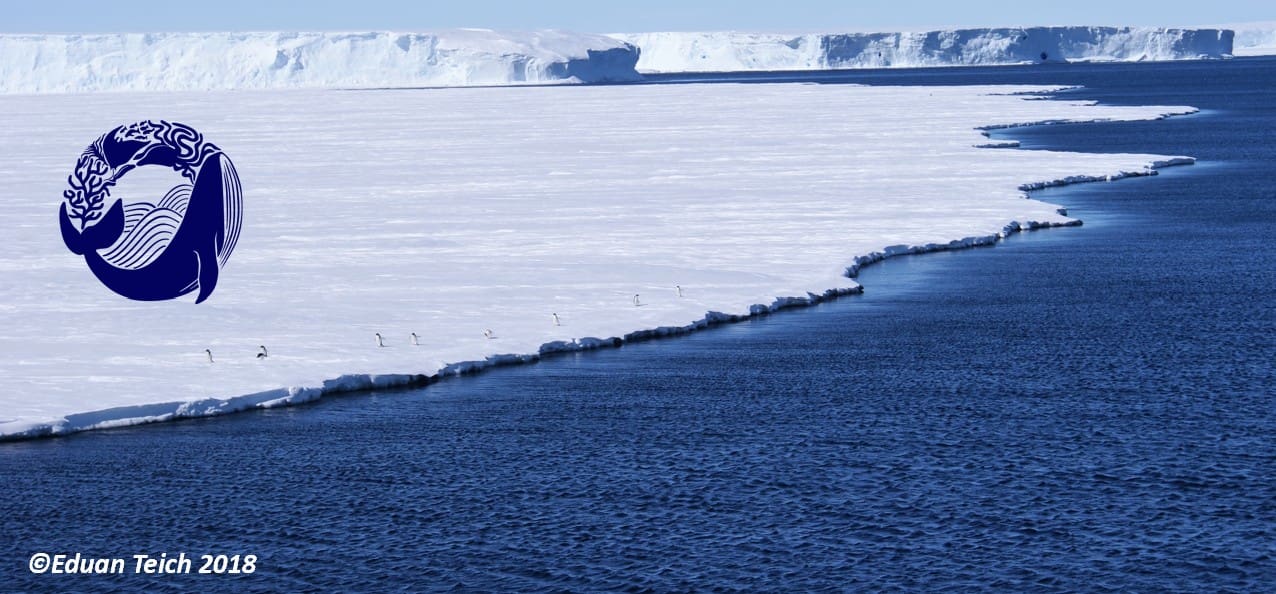 SANAP’s Research Footprint
SANAP’s Research Footprint Through SANAP, South African researchers from various institutions are contributing world-class science to understand and protect the Southern Ocean:
Through SANAP, South African researchers from various institutions are contributing world-class science to understand and protect the Southern Ocean: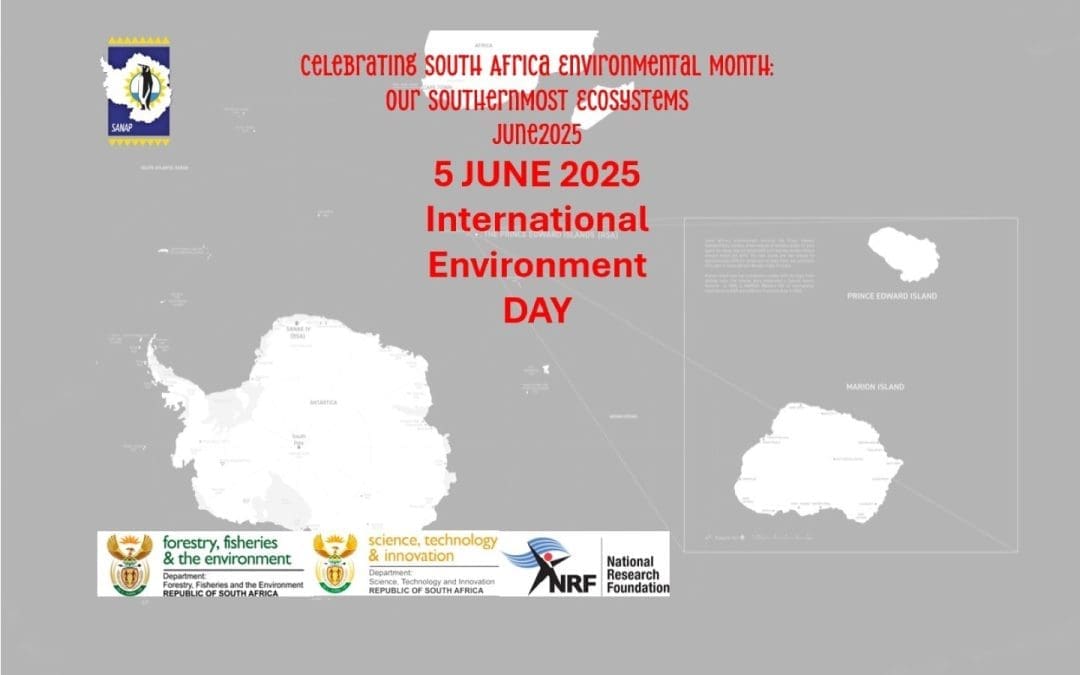
 The Southern Ocean: A Climate Regulator: The Southern Ocean surrounding Antarctica is a house of climate regulation, absorbing vast amounts of atmospheric carbon and heat. SANAP researchers are actively researching ocean currents, sea ice dynamics, and carbon cycling to better understand how these processes are evolving in a warming world. (Photo credit: A Zietsman)
The Southern Ocean: A Climate Regulator: The Southern Ocean surrounding Antarctica is a house of climate regulation, absorbing vast amounts of atmospheric carbon and heat. SANAP researchers are actively researching ocean currents, sea ice dynamics, and carbon cycling to better understand how these processes are evolving in a warming world. (Photo credit: A Zietsman)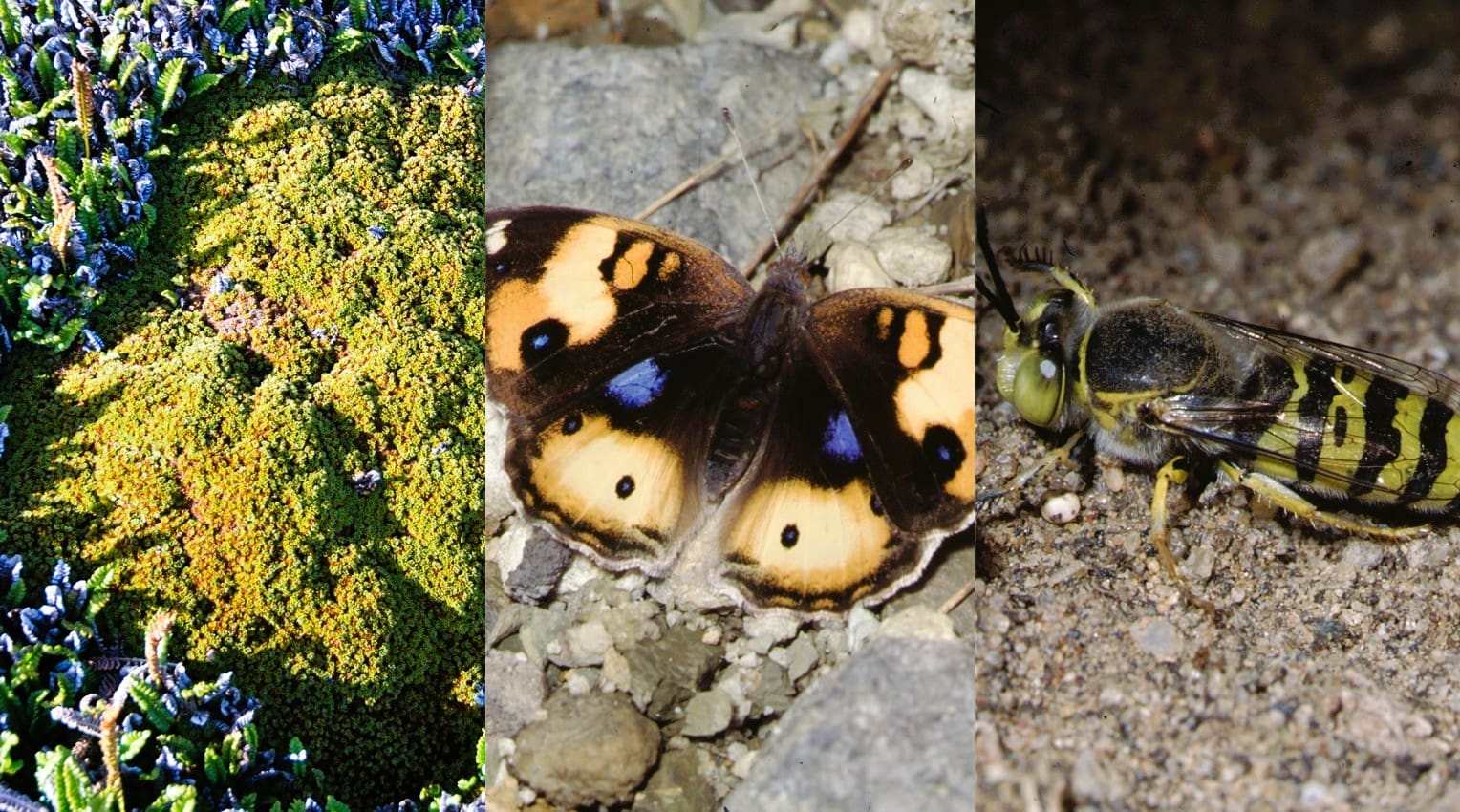 Protecting Life on the Edge: From the wandering albatross on Marion Island to microscopic extremophiles in Antarctic soils, life persists against all odds in these regions. SANAP’s biodiversity monitoring projects are uncovering the intricate web of life that depends on these environments — and how threats such as invasive species, plastic pollution, and climate variability are impacting these ecosystems. (Photo Credit left: M Greve, middle & right: CJ Scheepers)
Protecting Life on the Edge: From the wandering albatross on Marion Island to microscopic extremophiles in Antarctic soils, life persists against all odds in these regions. SANAP’s biodiversity monitoring projects are uncovering the intricate web of life that depends on these environments — and how threats such as invasive species, plastic pollution, and climate variability are impacting these ecosystems. (Photo Credit left: M Greve, middle & right: CJ Scheepers)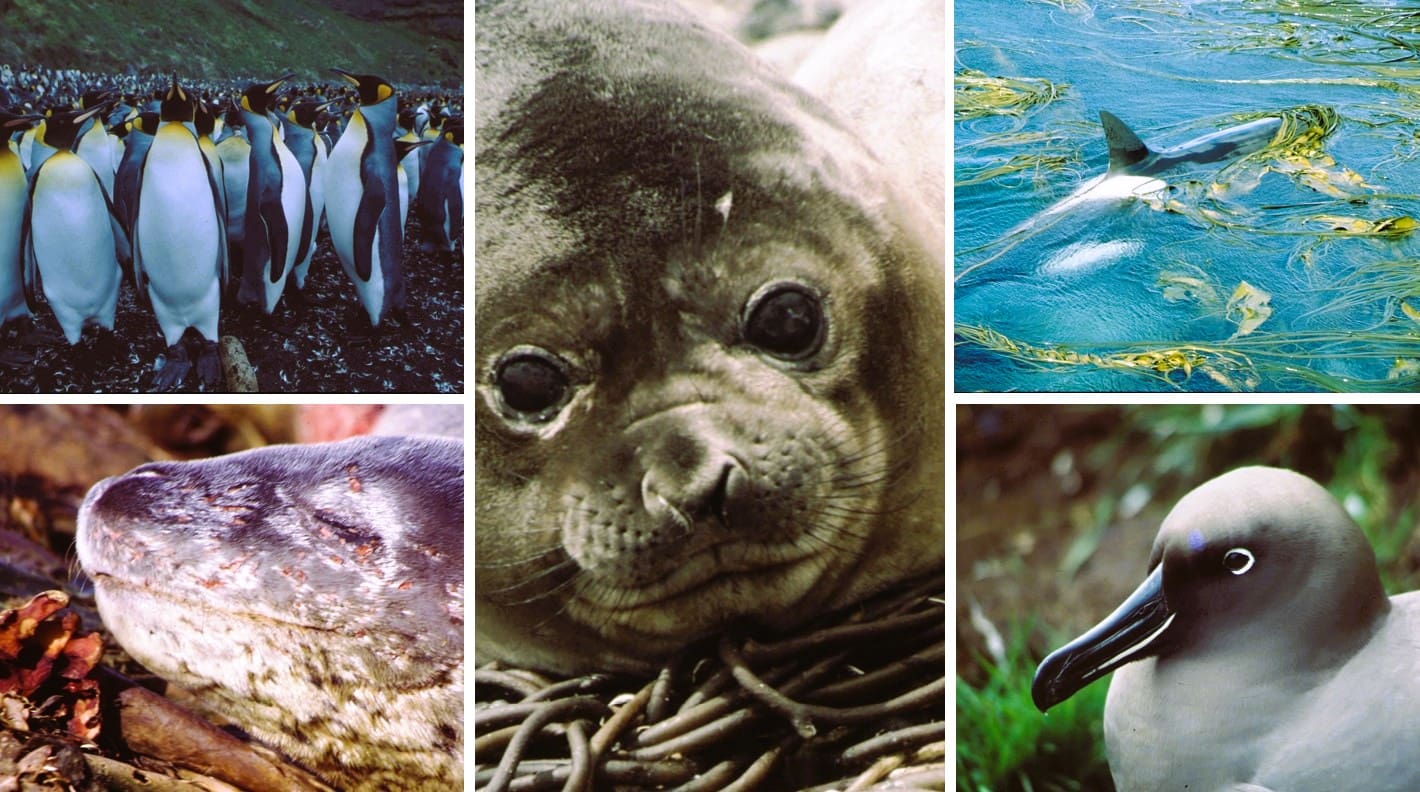 Long-Term Science, Global Impact: With decades of data collection and continuous human presence at SANAP’s research stations, SANAP long-term research projects offer insights into environmental change. Through collaborations with international partners, SANAP helps shape global understanding of polar processes and their far-reaching effects. This World Environment Day, SANAP celebrates the resilience of our southernmost ecosystems and the SANAP community is dedicated to its preservation. As stewards of the Antarctic and sub-Antarctic, SANAP remain committed to advancing knowledge, promoting conservation, and ensuring these unique environments endure for future generations. (Photo Credit: Greg Hofmeyr)
Long-Term Science, Global Impact: With decades of data collection and continuous human presence at SANAP’s research stations, SANAP long-term research projects offer insights into environmental change. Through collaborations with international partners, SANAP helps shape global understanding of polar processes and their far-reaching effects. This World Environment Day, SANAP celebrates the resilience of our southernmost ecosystems and the SANAP community is dedicated to its preservation. As stewards of the Antarctic and sub-Antarctic, SANAP remain committed to advancing knowledge, promoting conservation, and ensuring these unique environments endure for future generations. (Photo Credit: Greg Hofmeyr)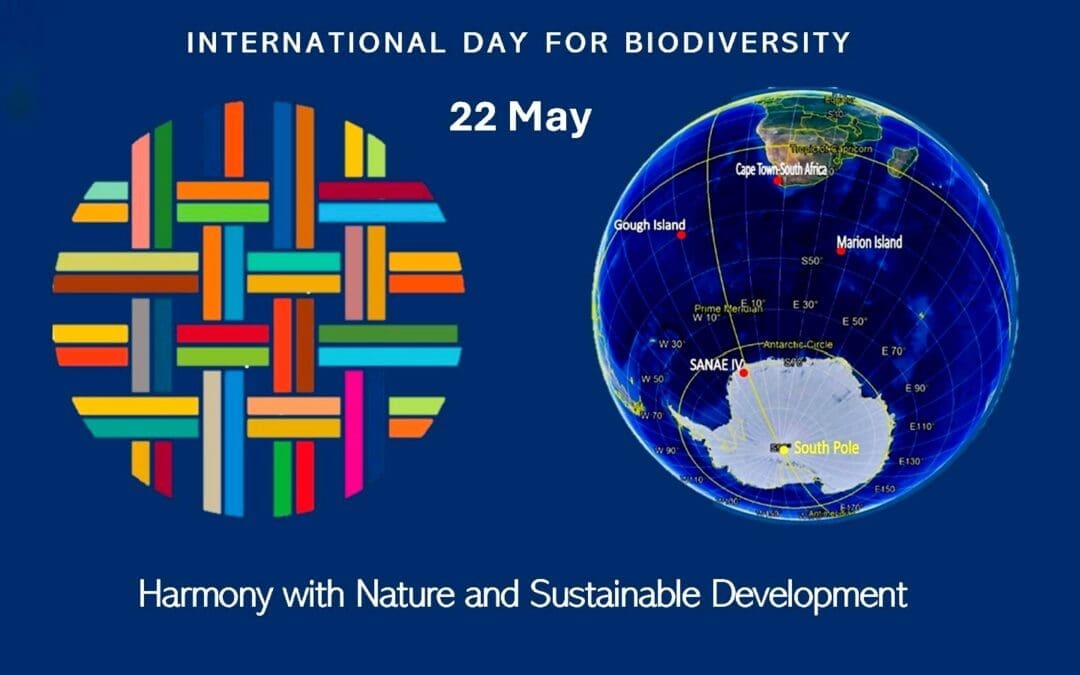
 The United Nations has designated May 22 as the International Day for Biological Diversity (IDB), a day to reflect on the vital role biodiversity plays in sustaining life on Earth. The 2025 theme, “Harmony with Nature and Sustainable Development,” underscores the importance of conserving biodiversity to ensure a sustainable future for both people and the planet. It is a timely reminder that a thriving natural world is the foundation of human well-being and a cornerstone for achieving the Sustainable Development Goals.
The United Nations has designated May 22 as the International Day for Biological Diversity (IDB), a day to reflect on the vital role biodiversity plays in sustaining life on Earth. The 2025 theme, “Harmony with Nature and Sustainable Development,” underscores the importance of conserving biodiversity to ensure a sustainable future for both people and the planet. It is a timely reminder that a thriving natural world is the foundation of human well-being and a cornerstone for achieving the Sustainable Development Goals. In South Africa, this day holds special meaning for the South African National Antarctic Programme (SANAP). Operating across three key research stations — Antarctica, Marion Island (part of the Prince Edward Islands), and Gough Island — SANAP plays a crucial role in understanding and preserving the unique biodiversity of the sub-Antarctic and Antarctic regions. These remote and fragile ecosystems are home to countless species, many of which are found nowhere else on Earth.
In South Africa, this day holds special meaning for the South African National Antarctic Programme (SANAP). Operating across three key research stations — Antarctica, Marion Island (part of the Prince Edward Islands), and Gough Island — SANAP plays a crucial role in understanding and preserving the unique biodiversity of the sub-Antarctic and Antarctic regions. These remote and fragile ecosystems are home to countless species, many of which are found nowhere else on Earth. For decades, SANAP-supported scientists have been at the forefront of biodiversity research in these regions. Their work includes long-term monitoring of bird and marine mammal populations, studies on invasive species, climate change impacts, and ecosystem dynamics. Through rigorous field research and environmental stewardship, SANAP contributes to global knowledge and conservation efforts, ensuring these pristine environments continue to thrive for generations to come.
For decades, SANAP-supported scientists have been at the forefront of biodiversity research in these regions. Their work includes long-term monitoring of bird and marine mammal populations, studies on invasive species, climate change impacts, and ecosystem dynamics. Through rigorous field research and environmental stewardship, SANAP contributes to global knowledge and conservation efforts, ensuring these pristine environments continue to thrive for generations to come. On this International Day for Biological Diversity, SANAP reaffirms its commitment to protecting the biodiversity of the Southern Ocean and its islands — not only for their intrinsic value but also for the essential role they play in the global ecosystem.
On this International Day for Biological Diversity, SANAP reaffirms its commitment to protecting the biodiversity of the Southern Ocean and its islands — not only for their intrinsic value but also for the essential role they play in the global ecosystem.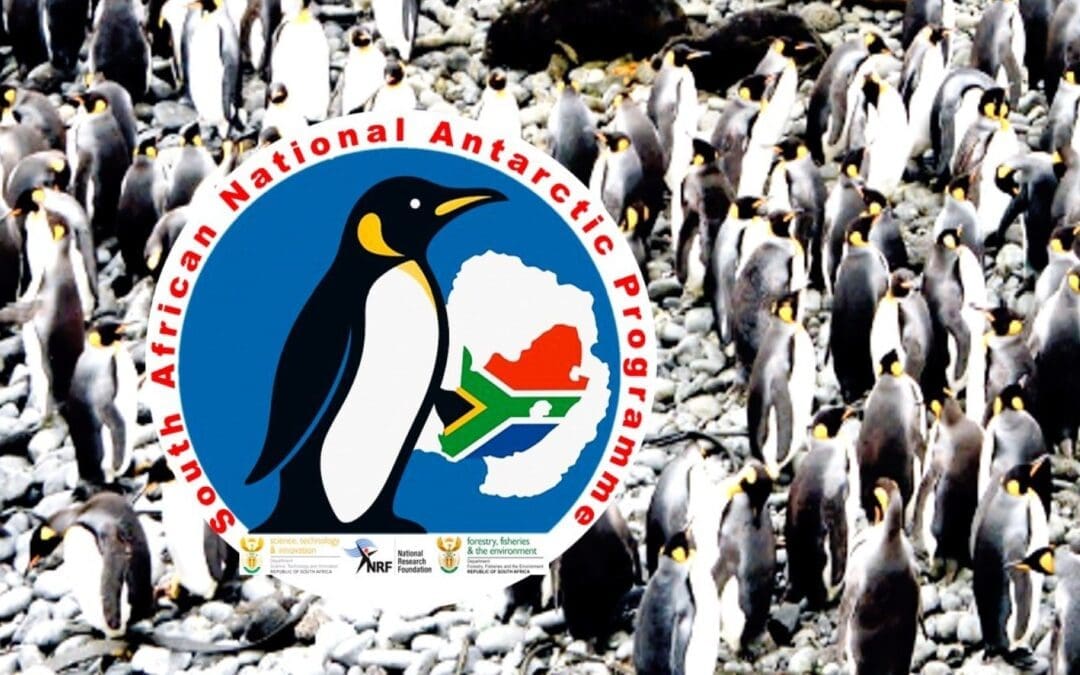
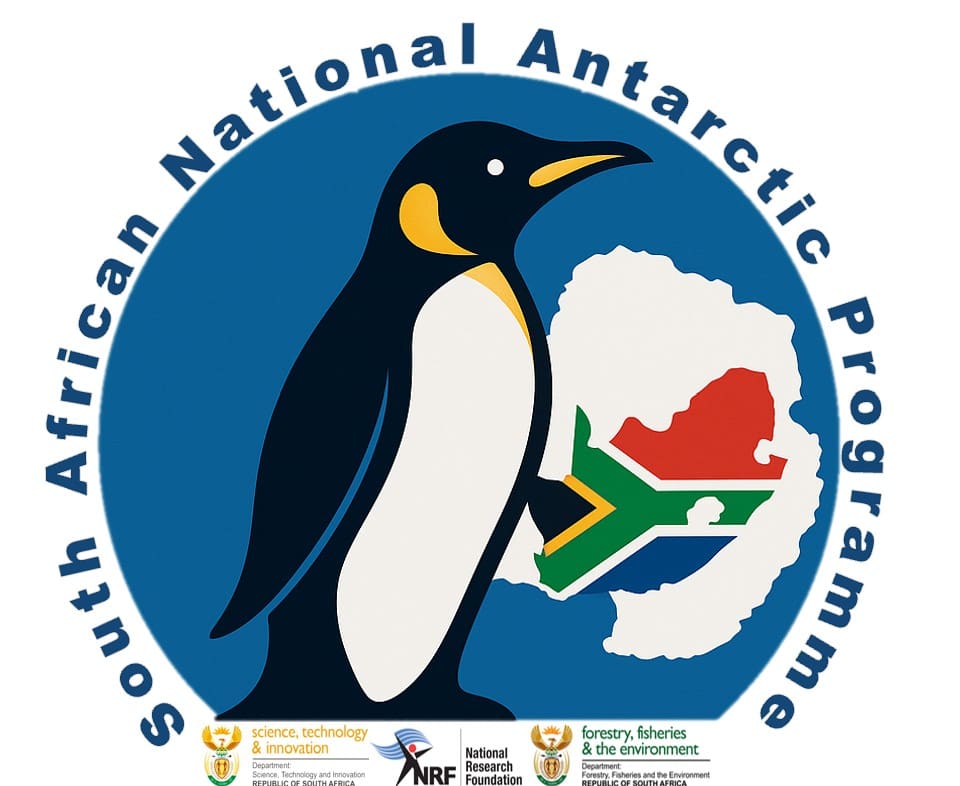 Every year on April 25th, we celebrate International Penguin Day—a global reminder of the unique role penguins plays in our planet’s ecosystems. These birds are not just symbols of the icy South—they are indicators of ocean health and climate change. From the sub-Antarctic islands to the Antarctic continent itself, penguins serve as sentinels of the sea, helping scientists track environmental shifts that affect us all.
Every year on April 25th, we celebrate International Penguin Day—a global reminder of the unique role penguins plays in our planet’s ecosystems. These birds are not just symbols of the icy South—they are indicators of ocean health and climate change. From the sub-Antarctic islands to the Antarctic continent itself, penguins serve as sentinels of the sea, helping scientists track environmental shifts that affect us all. South Africa plays a vital role in this mission through its National Antarctic Programme (SANAP), which supports long-term ecological research at key sites such as Gough Island, Marion Island, and Antarctica. These research stations are crucial hubs for studying penguin populations like the Northern Rockhopper on Gough Island and the Macaroni penguins on Marion Island. Scientists monitor breeding patterns, foraging behaviour, and survival rates—data that provide early warnings about oceanic changes. In Antarctica, SANAP researchers study Adélie and Emperor penguins, whose survival is intimately tied to the health of sea ice and krill populations.
South Africa plays a vital role in this mission through its National Antarctic Programme (SANAP), which supports long-term ecological research at key sites such as Gough Island, Marion Island, and Antarctica. These research stations are crucial hubs for studying penguin populations like the Northern Rockhopper on Gough Island and the Macaroni penguins on Marion Island. Scientists monitor breeding patterns, foraging behaviour, and survival rates—data that provide early warnings about oceanic changes. In Antarctica, SANAP researchers study Adélie and Emperor penguins, whose survival is intimately tied to the health of sea ice and krill populations.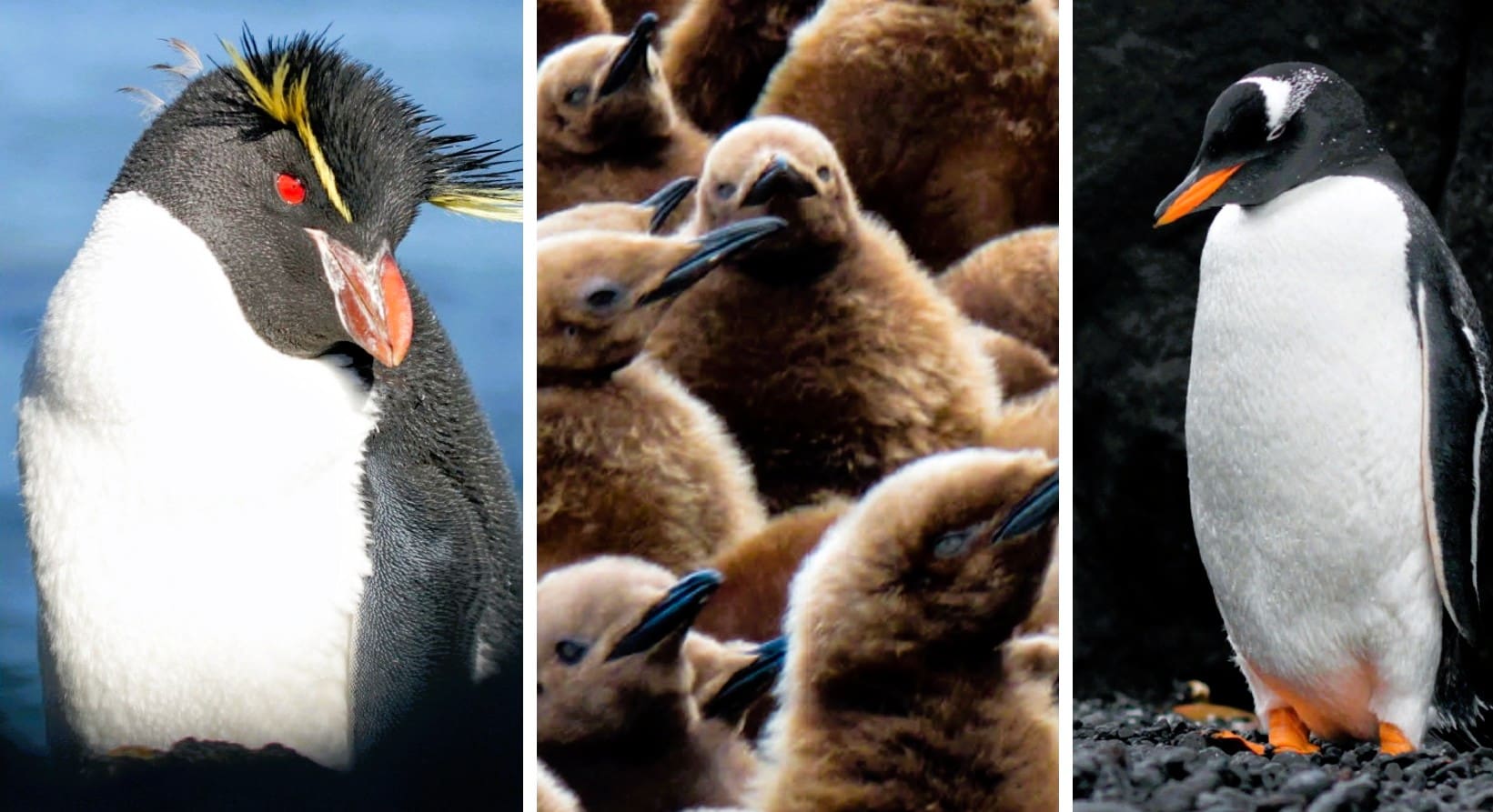 By investing in these research efforts, South Africa not only contributes to global conservation science but also highlights the importance of protecting our shared polar heritage. This International Penguin Day let’s celebrate the science that keeps these beloved birds waddling into the future.
By investing in these research efforts, South Africa not only contributes to global conservation science but also highlights the importance of protecting our shared polar heritage. This International Penguin Day let’s celebrate the science that keeps these beloved birds waddling into the future.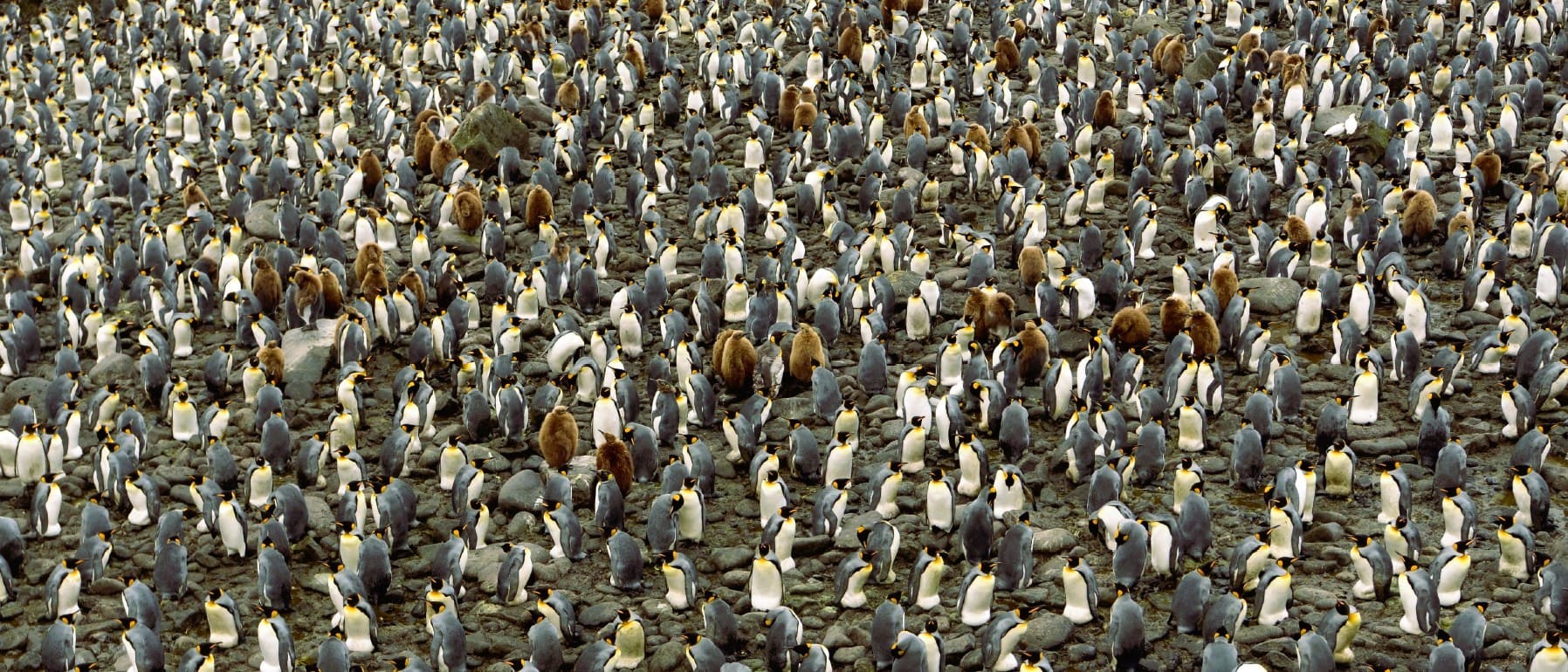
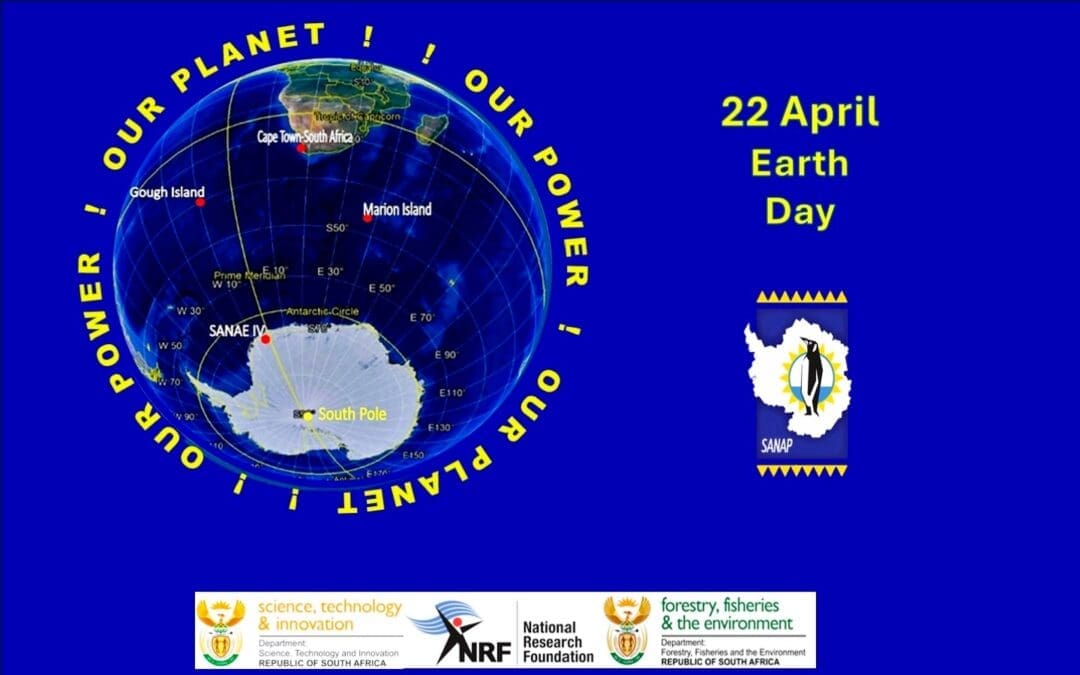
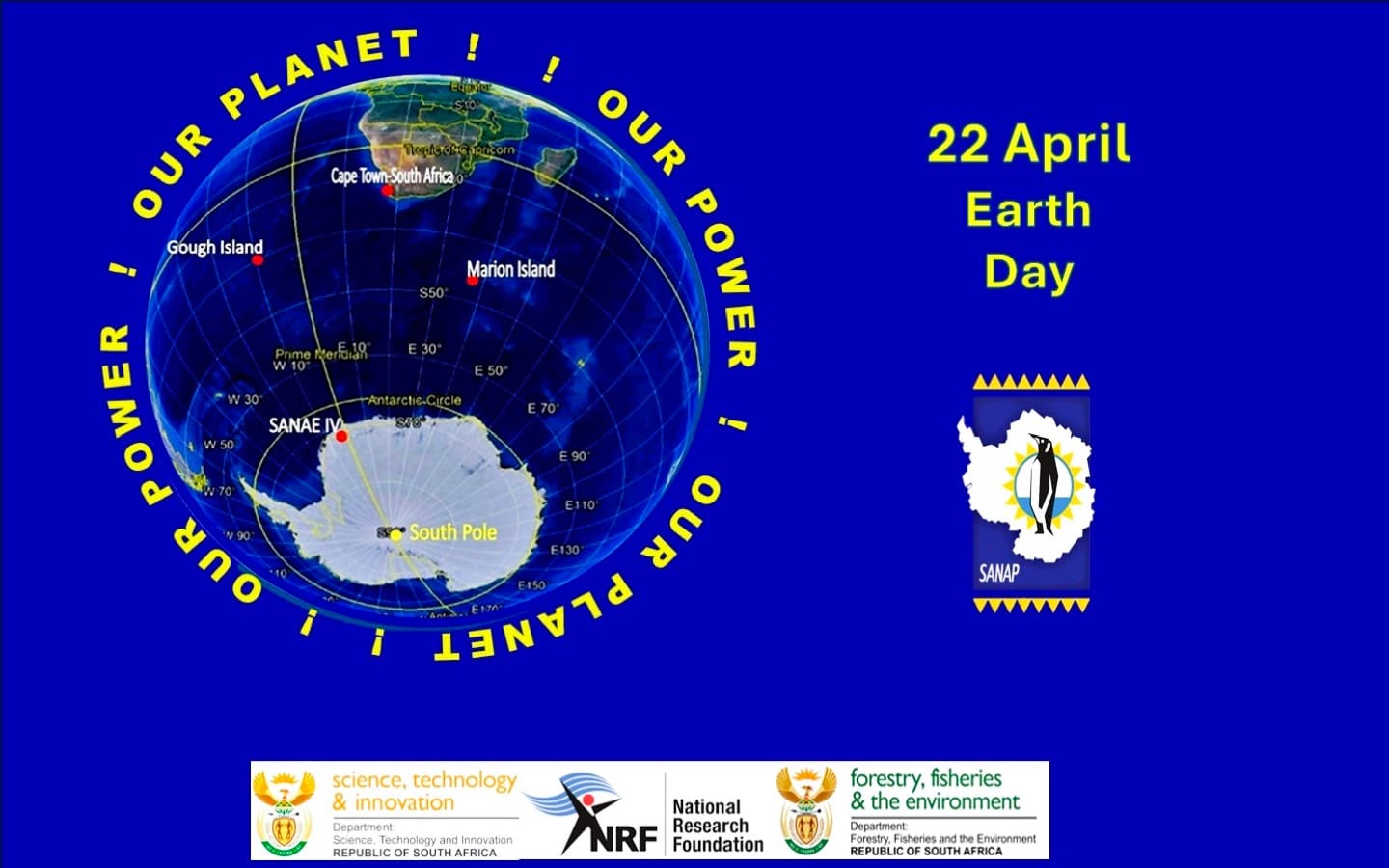 On
On  The work conducted through SANAP not only enhances our understanding of Earth’s most vulnerable environments but also strengthens global collaboration on environmental sustainability. Long-term monitoring of weather patterns, sea temperatures, and wildlife populations across these islands contributes directly to international climate assessments and helps predict future planetary changes. As we mark Earth Day, let us celebrate the dedication of researchers who brave the extremes to ensure a liveable Earth for generations to come. Their efforts remind us that the answers to many of our environmental challenges lie in the farthest corners of our world—and that the time to act on them is now.
The work conducted through SANAP not only enhances our understanding of Earth’s most vulnerable environments but also strengthens global collaboration on environmental sustainability. Long-term monitoring of weather patterns, sea temperatures, and wildlife populations across these islands contributes directly to international climate assessments and helps predict future planetary changes. As we mark Earth Day, let us celebrate the dedication of researchers who brave the extremes to ensure a liveable Earth for generations to come. Their efforts remind us that the answers to many of our environmental challenges lie in the farthest corners of our world—and that the time to act on them is now.




